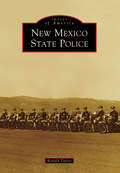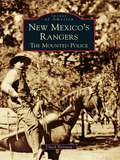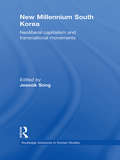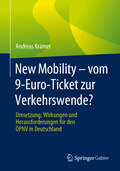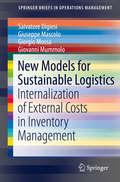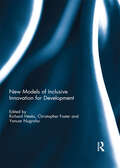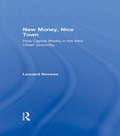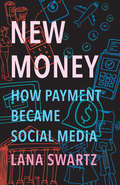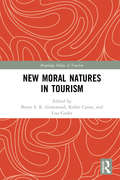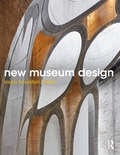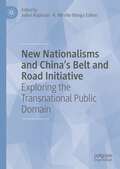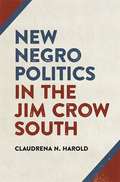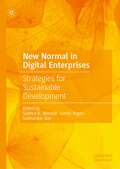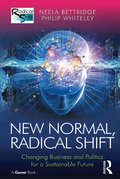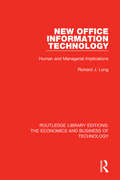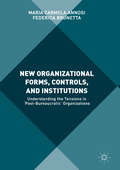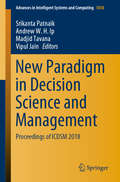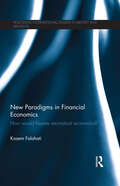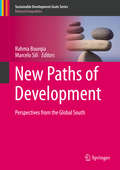- Table View
- List View
New Mexico Cocktails: A History of Drinking in the Land of Enchantment (American Palate)
by Greg MaysNew Mexico may appear to be the land of a thousand Margaritas, but its distilleries and historic cocktails are complex enough to satisfy even the most discerning palate. Cowboys and banditos alike distilled and drank their way to infamy. Prohibition drinkers masked the questionable spirits with cocktails at local joints like the legendary triple-level speakeasy of Santa Fe that was so secret, it had no name. Though the state had no legal distilleries for several decades following Prohibition, Arturo Jaramillo created the quintessential New Mexican cocktail in 1965. When Don Quixote Distillery opened in 2005, it set the stage for a cocktail revolution. Cocktail enthusiast Greg Mays explores a boozy history spiked with anecdotes and garnished with over one hundred simple recipes for the home bartender.
New Mexico State Police (Images of America)
by Ronald TaylorThe New Mexico State Police traces its beginnings to the New Mexico Mounted Police, a statewide law-enforcement agency that was disbanded in 1921. No state law enforcement existed until the formation of the New Mexico Motor Patrol in 1933. A year and a half later, the governor of the state of New Mexico and the chief of the patrol saw the need to expand their forces to better serve the citizens of New Mexico. The New Mexico State Police formed in 1935, marking the beginning of what has become many years of tradition and service.
New Mexico's Rangers: The Mounted Police (Images of America)
by Chuck HornungThe New Mexico Mounted Police were forged from a frontier civil crisis and hammered to life upon the anvil of necessity. The Sunshine Territory of New Mexico had become the last outlaw haven in the Southwest. In the tradition of their red-coated namesake, the Northwest Mounted Police of Canada, this small band of range riders used their fists, guns, and brains to restore law and order during the closing years of New Mexico's territorial era. They carried their mission forward into the early days of statehood.
New Millennium South Korea: Neoliberal Capitalism and Transnational Movements (Routledge Advances in Korean Studies)
by Jesook SongDespite the common held belief that Asian nations have displayed anti-market tendencies of under-consumption and export-oriented trade since the Asian financial crisis, in the 10 years since the crisis, South Korea has bucked this trend accruing a higher debt rate than the US. This groundbreaking collection of essays addresses questions such as how did the open market policies and restructuring processes implemented during the Asian financial crisis magnify the consumption and debt level in South Korea to such an extent? What is the impact of these financial changes on the daily lives of people in different cultural and socio-economic groups? In examining these questions the authors provide valuable insight into the rise of financial capitalism, transnational mobility and the implications of neoliberal governing tactics following the Asian Financial Crisis. Examining South Korea’s transformation during the early years of the 21st century, New Millenium South Korea will be of interest to anthropologists, economists and sociologists, as well as students and scholars of Korean Studies.
New Mobility – vom 9-Euro-Ticket zur Verkehrswende?: Umsetzung, Wirkungen und Herausforderungen für den ÖPNV in Deutschland
by Andreas KrämerDieses Buch analysiert die Einführung und Auswirkungen des 9-Euro-Tickets und seines Nachfolgers, des Deutschlandtickets, im deutschen Nahverkehr. Es zeigt, wie diese Maßnahmen im Kontext des Entlastungspakets von 2022 entstanden sind, umgesetzt wurden und welchen Einfluss sie auf die Verkehrs- und Klimawende in Deutschland haben.Die Einführung des 9-Euro-Tickets stieß zunächst auf Skepsis, insbesondere hinsichtlich der Umsetzung, Effektivität, Effizienz und Finanzierung. Später wird dann das Bild des „Sommermärchens“ zur Beschreibung genutzt. Auch beim Nachfolgeangebot zum 9-Euro-Ticket bestehen in der ersten Marktphase erhebliche Unsicherheiten darüber, inwiefern es zu Fahrtenverlagerungen und positiven Klimawirkungen kommt. Während der Implementierungsphase wird immer deutlicher, dass die Wirkungen mehr als ein Entlastungselement umfassen und eine gesamtgesellschaftliche und volkswirtschaftliche Betrachtung erfordern. Der Autor bietethierfür allumfassende Einblicke in die Herausforderungen und Potenziale, die die Diskussionen um das 9-Euro-Ticket sowie Deutschlandticket begleitet haben. Er geht auch darauf ein, wie in Deutschland Reformen tatsächlich umsetzbar sind, sofern ein politischer Wille besteht und zeigt, wie Mobilität – besonders bezogen auf den ÖPNV – nachhaltig und kundenorientiert gedacht werden kann. Beide Wirkungen zusammen machen deutlich, dass eine Verkehrs- und Klimawende in Deutschland tatsächlich möglich ist. Die damit verbundenen Chancen, aber auch Risiken in der Gestaltung sind Gegenstand dieses Buches.Das Buch enthält vier Teile: Im ersten Schritt wirft der Autor einen Blick zurück und ermittelt, wo der ÖPNV Mitte 2022 im Allgemeinen steht. Des Weiteren werden im zweiten Teil die Einführung, Umsetzung und zunächst ambivalenten Erfahrungen mit dem 9-Euro-Ticket evaluiert. Der dritte Teil geht auf die Ausgestaltung, öffentliche Rezeption und den Wirkungsmechanismen des Nachfolgeangebots Deutschlandticket ein. Der letzte Teil wagt einen Blick nach vorne und geht der Frage nach, welche Optionen für eine Zeit „nach dem Deutschlandticket“ bestehen.
New Models for Sustainable Logistics
by Salvatore Digiesi Giuseppe Mascolo Giorgio Mossa Giovanni MummoloThis book introduces new inventory models to support decision-making when cost of externalities are jointly considered along with costs of logistics. Internalization of cost of externalities gives rise to new logistics costs estimates and functions which managers, researchers, lecturers and students should refer in facing with logistics issues. This book focuses on freight transports of industrial production systems. Logistics play a key role for industries since it reveals a critical function designed and managed to pursue economic goals. A large amount of literature is available providing models, which can be used to minimize logistic costs. However, these models usually neglect externalities. New Models for Sustainable Logistics: Internalization of External Costs in Inventory Management is comprised of three chapters. Chapter 1 provides a taxonomy of external costs figures as well as data set enabling the reader to perform reliable estimates of freight transport external costs. To this purpose, a full scale case study is developed. Chapter 2 describes a new sustainable inventory management model whose cost functions include externalities. The classical 'Economic Order Quantity' model is re-formulated and the new concept of Sustainable Order Quantity (SOQ) is defined. Finally, in Chapter 3 the SOQ model is formulated for different inventory management applications referred to both deterministic and stochastic production environments. Numerical examples are also provided.
New Models of Inclusive Innovation for Development
by Richard Heeks, Christopher Foster and Yanuar NugrohoInequality and innovation are both rising issues on the international development agenda. Their intersection is inclusive innovation; defined as the inclusion within some aspect of innovation of groups who are currently marginalised. This is a topic of increasing interest and activity. Large firms have been working to deliver innovative goods and services for base-of-the-pyramid consumers: the c.3 billion who live on less than US$2 per day. Within poor communities, an influx of new technology, finance and capabilities has spurred more localised innovation.A variety of different models have been identified by which this activity is organised and implemented, such as inclusive innovation clusters, grassroots innovation, frugal innovation, innovation platforms, and inclusive user-producer interactions. This book explores the operation, conceptualisation and impact of these models, and analyses the nature of inclusive innovation practice and research. It will be of interest to researchers, policy-makers, strategists and other practitioners associated with these new forms of innovation.This book was originally published as a special issue of Innovation and Development.
New Money, Nice Town: How Capital Works in the New Urban Economy
by Leonard NevarezThe economic restructuring that has gone on since the 1980s has produced a new economic space in which service and high tech firms are at the forefront of innovation. One of the features of the new economy is what pop geographer Joel Kotkin calls "nerdistans," or smaller cities with a substantial high tech sector, limits on growth, environmentally friendly policies and a generally well-educated population. In New Money, Nice Town, Leonard Nevarez takes a close look at how "new economy" firms in "quality of life" cities interact with local political structures, finding that they are both more liberal and more detached than their traditional counterparts. This new global economy has created communities whose politics are more democratic, but also more tenuous and unstable.
New Money: How Payment Became Social Media
by Lana SwartzA new vision of money as a communication technology that creates and sustains invisible—often exclusive—communities One of the basic structures of everyday life, money is at its core a communication media. Payment systems—cash, card, app, or Bitcoin—are informational and symbolic tools that integrate us into, or exclude us from, the society that surrounds us. Examining the social politics of financial technologies, Lana Swartz reveals what&’s at stake when we pay. This accessible and insightful analysis comes at a moment of disruption: from &“fin‑tech&” startups to cryptocurrencies, a variety of technologies are poised to unseat traditional financial infrastructures. Swartz explains these changes, traces their longer histories, and demonstrates their consequences. She shows just how important these invisible systems are. Getting paid and paying determines whether or not you can put food on the table. The data that payment produces is uniquely revelatory—and newly valuable. New forms of money create new forms of identity, new forms of community, and new forms of power.
New Moral Natures in Tourism (Routledge Research in the Ethics of Tourism Series)
by Lisa Cooke Kellee Caton Bryan S. GrimwoodHow do we understand human-nature relationships in tourism, or determine the consequences of these relationships to be "good," "bad," "right," "wrong," "fair," or "just"? What theoretical and philosophical perspectives can usefully orient us in the production and consumption of tourism towards living and enacting the "good life" with the more-than-human world? <P><P>This book addresses such questions by investigating relationships between nature and morality in tourism contexts. Recognizing that morality, much like nature, is embedded in histories and landscapes of power, the book engages with diverse theoretical and philosophical perspectives to critically review, appraise, and advance dialogue on the moral dimensions of natures. Contributing authors explore the very foundations of how we make sense of nature in tourism and leisure contexts—and how we might make sense of it differently. <P><P>The book will be essential reading for researchers, students, and practitioners grappling with questions about the moral values, frameworks, or practices best suited to mobilizing tourism natures. What will the future of tourism hold in terms of sustainability, justice, resilience, health, and well-being?
New Multinational Enterprises from Korea and Taiwan: Beyond Export-led Growth (Routledge Studies in International Business and the World Economy)
by Roger van HoeselThis volume represents the first substantive study of emerging multinationals (MNEs) from Asian economies, drawing on the unique experiences of South Korea and Taiwan. Combining an econometric investigation with detailed case studies of leading Korean and Taiwanese electronics companies, it aims to demystify the nature and theoretical implications of these dynamic economic regions.The author argues that many of these `new multinationals do not possess the characteristics typically ascribed to MNEs, such as technological leadership, strong marketing positions or advanced managerial capabilities. This is highlighted by documentation of recent developments in outward investment from Korea and Taiwan at both micro and macro level. The implications of the recent Asian crisis for the internationaliztion of Korean and Taiwanese firms are also explored.
New Museum Design
by Laura Hourston HanksNew Museum Design provides a critical and compelling selective survey of contemporary international museum design since 2010. It provides an accessible and analytic review of the architectural landscape of museum and gallery design in the 2010s. The book comprises twelve case study museum and gallery projects from across Europe, Asia, North America, Africa, the Middle East and Australia. Each built example is interrogated through an essay and a series of beautiful supporting illustrations and drawings. Where appropriate architectural analysis is cross-scale, extending from consideration of the artefact’s encounter with museum space at the most intimate scale, through detailed architectural readings, to the wider perspective of urban/landscape response. Similarly, the book is not confined in its thematic or architectural ‘typological’ scope, including museums and art galleries, as well as remodellings, extensions and new build examples. New Museum Design provides a critical snapshot of contemporary international museum architecture, in order to: better understand reasons for the state of current practice; reveal and explore on-going themes and approaches in the field; and to point towards seminal future design directions. This book is essential reading for any student or professional interested in museum design.
New Nationalisms and China's Belt and Road Initiative: Exploring the Transnational Public Domain
by Julien Rajaoson R. Mireille Manga EdimoThis book is a treatise on cultural globalization and the global political economy. By introducing the transnational public domain in the study of China’s Belt and Road Initiative (BRI), the book goes beyond existing theoretical frameworks involving both the ‘clash between civilizations’ and the ‘time-worn division’ of the world into North and South. It advances a new focus on the theoretical and empirical elements that canvass global cultural behaviours and reactionary attitudes to the expanding Chinese economic norms, cultures and values in different national contexts. Readers of political theory, global political economy, globalization, international relations, political sociology, cultural sociology, public policy and foreign policy analysis will find interest in the book. Whereas new nationalism couples with globalism, both concepts are rediscovered through various socio-economic contexts of BRI policy discourses, which produce conflicts, solidarities, new economic partnerships, and cooperation and resistance as types of contemporary nationalism. The new nationalism is approached as a dual-sided, relational, and dialectical phenomenon which readers will capture by paying particular attention to both the global and local scales of the social responses to the BRI.
New Negro Politics in the Jim Crow South
by Claudrena N. HaroldThis study details how the development and maturation of New Negro politics and thought were shaped not only by New York–based intellectuals and revolutionary transformations in Europe, but also by people, ideas, and organizations rooted in the South. Claudrena N. Harold probes into critical events and developments below the Mason-Dixon Line, sharpening our understanding of how many black activists―along with particular segments of the white American Left―arrived at their views on the politics of race, nationhood, and the capitalist political economy.
New Normal in Digital Enterprises: Strategies for Sustainable Development
by Subhankar Das Subhra R. Mondal Ceren YegenThis book discusses the significance of descriptive, predictive, and prescriptive digital enterprises and their practices for different functional domains and in different countries during COVID-19. It explores new dimensions in digital enterprises that are emerging after COVID-19. Varied topics discussed include virtual workplace and workflows, media use, digital security, e-governance, digital supply chains, increased use of AI, new HR practices, and sustainable development in post-pandemic era. The broad range of digital development topics will help business owners, digital professionals, managers, researchers, and academicians.
New Normal, Radical Shift: Changing Business and Politics for a Sustainable Future
by Philip Whiteley Neela BettridgeOur traditional ways of looking at economics, business and politics are not fit for purpose. The causes of the recent crisis were behavioural and international, but our measures are superficial and financial, recorded at a national or company level. This is combined with a fervent quest for endless ’growth’, no matter how unsustainable. Theory has to catch up with reality. Many books chart different courses for economic and business management but New Normal, Radical Shift is different. Using examples from international organizations around the world, it analyses not only the business model that failed, but challenges wider economic and political beliefs that employees’ interests always conflict with those of managers and business owners. Neela Bettridge and Philip Whiteley argue that the right messages about good practice in business struggle to be heard, not because of indifference or inertia, but because dysfunctional philosophies are still supported not only within business and business schools, but also within political circles and by trade unions, NGOs and others campaigning for workers’ rights. The central belief of the ’old normal’ is that profits are made by exploiting workers and the environment. In this book the authors’ arguments - all supported by exemplary case studies -demonstrate that this belief is false, opening up enormous possibilities in a ’new normal’ of enhanced working lives, environmental protection and business success.
New Office Information Technology: Human and Managerial Implications (Routledge Library Editions: The Economics and Business of Technology #30)
by Richard J. LongThis book, originally published in 1987, evaluates the human and managerial implications of new office information technology, based on the actual experiences of organisations using the new technology. A variety of issues are examined including those centred on the role of the manger, producitivity, unemployment, physical and mental health. Major emphasis is placed on describing and discussing the implementation of new technology and ways of utilization which maximise benefits.
New Organizational Forms, Controls, and Institutions
by Maria Carmela Annosi Federica BrunettaThis book highlights the growing number of 'post-bureaucratic' firms that are abandoning hierarchical organizational forms in favor of self-managing teams. Addressing the need to outperform, these new organization types foresee the benefits of an organic structure with new and more indirect forms of control, and aim to coordinate the activities of highly-skilled workers without relying on a bureaucratic superstructure. The chapters explore the tensions that exist between external and internal institutional forces. As new forms of control strategies emerge, mostly value-based, this book accounts for the cognitive categories, conventions, rules and logic that should be integrated and combined with traditional forms of managerial controls in order to enable co-existence with established bureaucratic frameworks. This book will be of interest to academics in the fields of organizational behavior and innovation management, and also practitioners and managers aiming to shift from a traditional hierarchical structure to post-bureaucratic forms.
New Orleans Coffee: A Rich History (American Palate Ser.)
by Suzanne StoneNew Orleans history is steeped in coffee. Café du Monde and Morning Call started serving café au lait more than a century ago.Outside the Cathedral of St. Louis in Jackson Square, early entrepreneurs like Old Rose provided eager churchgoers with the brew, and it was sold in the French Market beginning in the late 1700s. People gathered for business, socializing, politics and auctions at five hundred coffee exchanges and shops in the 1800s. Since 1978, myriad specialty coffee shops have opened to meet increasing demand for great coffee. Author Suzanne Stone presents the full story of this celebrated tradition, including how chicory became part of the city's special flavor.
New Orleans Pralines: Plantation Sugar, Louisiana Pecans, and the Marketing of Southern Nostalgia
by Anthony J. StanonisThe Creole praline arrived in New Orleans with the migration of formerly enslaved people fleeing Louisiana plantations after the Civil War. Black women street vendors made a livelihood by selling a range of homemade foods, including pralines, to Black dockworkers and passersby. The praline offered a path to financial independence, and even its ingredients spoke of a history of Black ingenuity: an enslaved horticulturist played a key role in domesticating the pecan and creating the grafted tree that would form the basis of Louisiana’s pecan orchards.By the 1880s, however, white New Orleans writers such as Grace King and Henry Castellanos had begun to recast the history of the praline in a nostalgic mode that harkened back to the prewar South. In their telling, the praline was brought to New Orleans by an aristocratic refugee of the French Revolution. Black street vendors were depicted not as innovative entrepreneurs but as loyal servants still faithful to their former enslavers. The rise of cultivated, shelled, and cheaply bought pecans—as opposed to the foraged pecans that early praline sellers had depended on—allowed better-resourced white women to move into the praline-selling market, especially as tourism emerged as a key New Orleans industry after the 1910s.Indeed, the praline became central to the marketing of New Orleans. Conventions often hired Black women to play the “praline mammy” role for out-of-towners, while stores sold pralines with mammy imagery, in boxes designed to look like cotton bales. After World War II, pralines went national with items like praline-flavored ice cream (1950s) and praline liqueur (1980s). Yet as the civil rights struggle persisted, the imagery of the praline mammy was recognized as an offensive caricature.As it uncovers the history of a sweet dessert made of sugar and pecans, New Orleans Pralines tells a fascinating story of Black entrepreneurship, toxic white nostalgia, and the rise of tourism in the Crescent City.
New Paradigm in Decision Science and Management: Proceedings of ICDSM 2018 (Advances in Intelligent Systems and Computing #1005)
by Vipul Jain Madjid Tavana Srikanta Patnaik Andrew W. H. IpThis book discusses an emerging area in computer science, IT and management, i.e., decision sciences and management. It includes studies that employ various computing techniques like machine learning to generate insights from huge amounts of available data; and which explore decision-making for cross-platforms that contain heterogeneous data associated with complex assets; leadership; and team coordination. It also reveals the advantages of using decision sciences with management-oriented problems. The book includes a selection of the best papers presented at the International Conference on Decision Science and Management 2018 (ICDSM 2018), held at the Interscience Institute of Management and Technology (IIMT), Bhubaneswar, India.
New Paradigms for Financial Regulation: Emerging Market Perspectives
by Eswar S. Prasad Masahiro KawaiThe global financial crisis has led to a sweeping reevaluation of financial market regulation and macroeconomic policies.<P><P> Emerging markets need to balance the goals of financial development and broader financial inclusion with the imperative of strengthening macroeconomic and financial stability. The third in a series on emerging markets, New Paradigms for Financial Regulation develops new analytical frameworks and provides policy prescriptions for how the frameworks should be adapted to a world of more free and more volatile capital.This volume provides an overview of the global regulatory landscape from the perspective of Asian emerging markets. The contributors discuss the many challenges ahead in developing sound and flexible financial regulatory systems for emerging market economies. The challenges are heightened by the rising integration of these economies into global trade and finance, the growing sophistication of their financial systems as globalization and emergence processes accelerate, and their potential vulnerability to instability arising from the financial markets in the advanced economies.The contributors provide guidance about pitfalls to be avoided, general principles that should guide the creation of sound regulatory systems, and valuable analytic perspectives about how to continue to broaden the financial sector and innovate while still maintaining financial and macroeconomic stability.
New Paradigms in Financial Economics: How Would Keynes Reconstruct Economics? (Routledge International Studies in Money and Banking #71)
by Kazem FalahatiThe recent global financial crisis has made the inadequacies of the scientific state of economics and finance glaringly obvious, as these disciplines gave the false reassurance that such a self-destructive phenomenon could not happen. A similar phenomenon arose in the 1930’s, when the pitfalls of the dominant economic theories were sharply exposed. Since then, the same analytical framework, in its new versions, has revealed a huge number of other empirical and experimental failures. On the other hand, the founders of the currently dominant theories in economics and finance (i.e. the standard paradigm) such as Walras (1834-1910), Modigliani (1918-2003) and Miller (1923-2000) have identified mathematical contradictions within their own foundational models, the root cause of which no one has yet discovered. The standard paradigm has thus lost the reason for its existence in the light of experience, experiments and logical rigour. This book identifies the heuristic cause of these external and internal contradictions of the standard paradigm and remedies these problems by offering a new paradigm which can explain and predict observed economic behaviour, and resolve the extant behavioural, empirical and experimental puzzles. The new paradigm offers a dramatically improved understanding of economic behaviour at the micro as well as macro level of the economy within an over-arching framework comprising the real and the financial sectors. It does so in a rigorous but simple and clear way, using an axiomatic approach. It also offers policy recommendations on how the economy should be managed to avoid severe swings. It therefore is of great interest to scholars and practitioners in economics and finance.
New Paths of Development: Perspectives from the Global South (Sustainable Development Goals Series)
by Rahma Bourqia Marcelo SiliThis book discusses the geopolitics of development from the point of view of the Global South. Written by scholars and development experts from Africa, Asia, and Latin America, this volume presents reflections on various historical, current, and future trajectories of development in the contemporary Global South. The book is divided into five parts. Part I focuses on the relationship of development in the Global South to globalization, discussing the diversity of situations across countries in structural terms. Part II critiques and analyzes the concept and paradigms of development, emphasizing alternative discourses and policy models. Part III focuses on the analysis of the relationship between environment and development, showing how environmental conditions have become a key factor in the renewal of development thinking. Part IV examines different cultural strategies and conceptions constituting the basis of development thinking and policy in different fields. Part V addresses the construction of knowledge pertaining to the Global South, revisiting the theoretical trajectory of development models and advocating for the construction of new ideas around the region. Providing a multidimensional look at development in the Global South, this volume will benefit academics, development experts, and postgraduate students interested in having a global vision of the ideas of development in different territorial and cultural fields.
New Pathways to Civil Justice in Europe: Challenges of Access to Justice
by Xandra Kramer Alexandre Biard Jos Hoevenaars Erlis ThemeliThis book focuses on four topical and interconnected, innovative pathways to civil justice within the context of securing and improving access to justice: the use of Artificial Intelligence and its interactions with judicial systems; ADR and ODR tracks in privatising justice systems; the effects of increased self-representation on access to justice; and court specialization and the establishment of commercial courts to counter the trend of vanishing court trials. Top academics and experts from Europe, the US and Canada address these topics in a critical and multidisciplinary manner, combining legal, socio-legal and empirical insights. The book is part of ‘Building EU Civil Justice’, a five-year research project funded by the European Research Council. It will be of interest to scholars and policymakers, as well as practitioners working in the areas of civil justice, alternative dispute resolution, court systems, and legal tech. The chapters “Introduction: The Future of Access to Justice – Beyond Science Fiction” and “Constituting a Civil Legal System Called “Just”: Law, Money, Power, and Publicity” are available open access under a Creative Commons Attribution 4.0 International License via link.springer.com.

